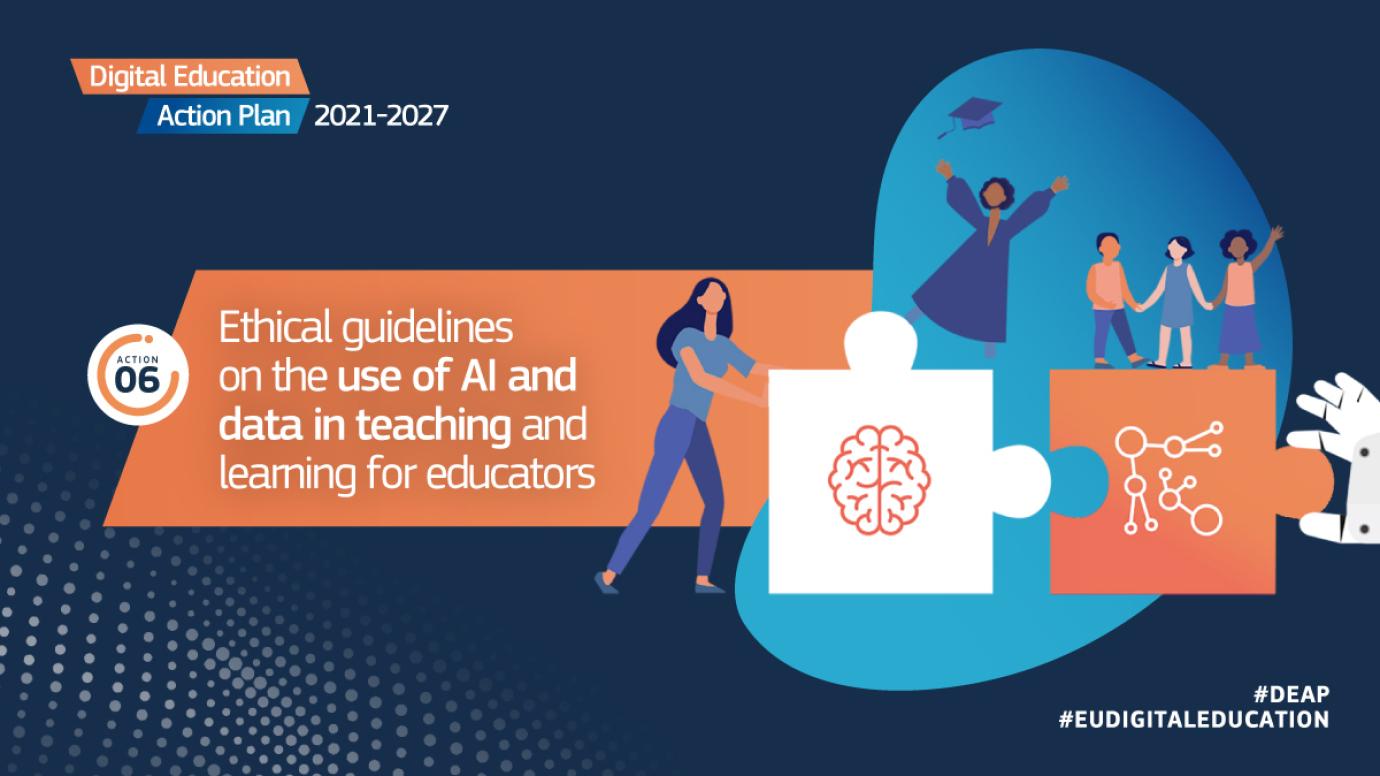Ethical guidelines on the use of AI and data in teaching and learning for educators
Today, artificial intelligence (AI) systems are part of our everyday lives. As they continue to evolve and data use increases, it is very important to develop a better understanding of their impact on the world around us, including on education and training.
AI has great potential to transform education and training for students, teachers and school staff. It could, for example, help to reduce early school leaving, to compensate for learning difficulties and to support teachers with differentiated or individualised learning through language learning applications, text-to-speech generators, AI mentors for learners, and more.
As this happens, there is a growing need for researchers, educators and students to have a basic understanding of AI and data use to be able to engage positively, critically and ethically with this technology and to exploit its full potential.
Objectives
To help teachers and educators to understand the potential that the applications of AI and data use can have in education and to raise awareness of the possible risks, the European Commission has developed ethical guidelines on the use of AI and data in teaching and learning.
The Commission will support related research and innovation activities through the Horizon Europe programme and develop a training programme for researchers and students on the ethical aspects of AI and data use.
Key activities
To help tackle these challenges, in October 2022 the Commission published ethical guidelines on the use of AI and data in teaching and learning for educators.
The guidelines provide practical support and guidance mostly for primary and secondary teachers with some or no prior experience in using AI. Using concrete examples, the guidelines seek to
- explain how AI is used in schools
- help teachers and students with their teaching and learning
- support systems and administrative processes in educational settings
- present the ethical considerations and requirements underpinning the guidelines
The guidelines and the executive summary were developed with the support of an informal Commission expert group bringing together expertise from education and academia. The eTwinning community (survey and focus group) and the working group on digital education learning, training and assessment (DELTA) were consulted throughout the preparation phase of the report and the guidelines, as well as various other Commission Directorate-Generals, including its Joint Research Centre (JRC).
More information about the guidelines can be found in the factsheet, infographic and the short explanatory video below.
Further activities as part of this action
Other activities as part of Action 6 include
- support for relevant activities under Horizon Europe, including:
- a call for proposals for training – ‘HORIZON-WIDERA-2021-ERA-01-91: Ensuring the reliability of and trust in the quality of research ethics expertise in the context of new/emerging technologies’
- a call on extended reality in education and training
Expected results/deliverables
- the promotion of the ethical use of AI and data for teaching and learning
- the enhancement of skills and knowledge on ‘ethics by design for AI’ among university students and researchers, accompanied by a target of 45% female participation in training activities
- the encouragement of the use of extended reality in education and training
Outputs
- Ethical guidelines on the use of AI and data in teaching and learning for educators
- Executive summary of the report of the expert group to contribute and prepare the guidelines. The executive summary will be available soon in French, German and Bulgarian.
Timeline
- July 2021-June 2022 – meetings of the Commission expert group
- October 2022 – launch of ethical guidelines on the use of AI and data in teaching and learning for educators
- By the end of 2021 – launch of the call for proposals ‘HORIZON-WIDERA-2021-ERA-01-91: Ensuring the reliability of and trust in the quality of research ethics expertise in the context of new/emerging technologies’
- By the end of 2021 – launch of the call on extended reality (XR) in education and training
Funding
This action is funded by the EU’s Erasmus+ and Horizon Europe programmes.
Get in touch
If you are interested to know more about this action, you can get in touch with us by email at EAC-DIGITALEDUCATION@ec.europa.eu.
Follow @EUDigitalEdu for the latest news and developments on this action and the whole Digital Education Action Plan.



